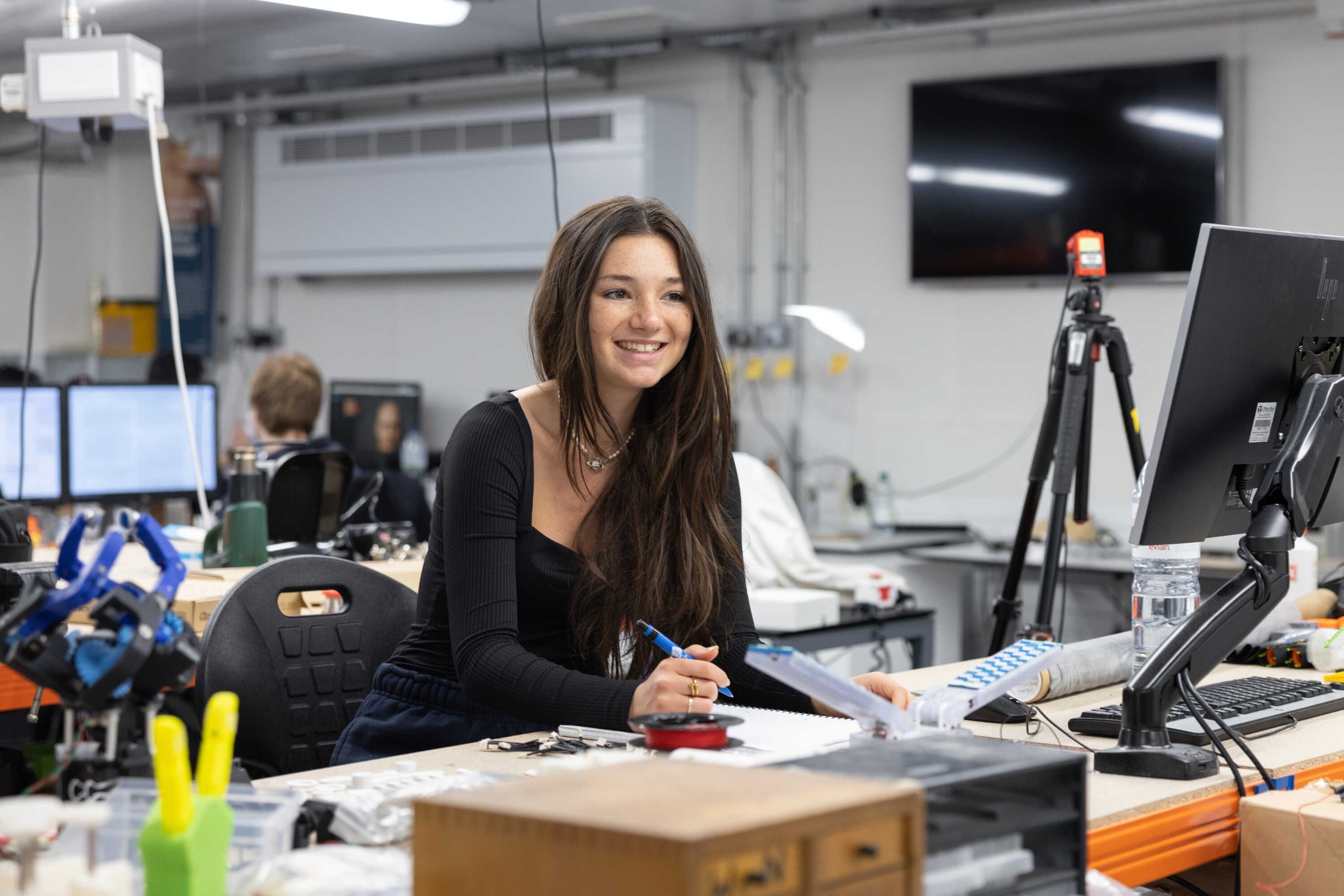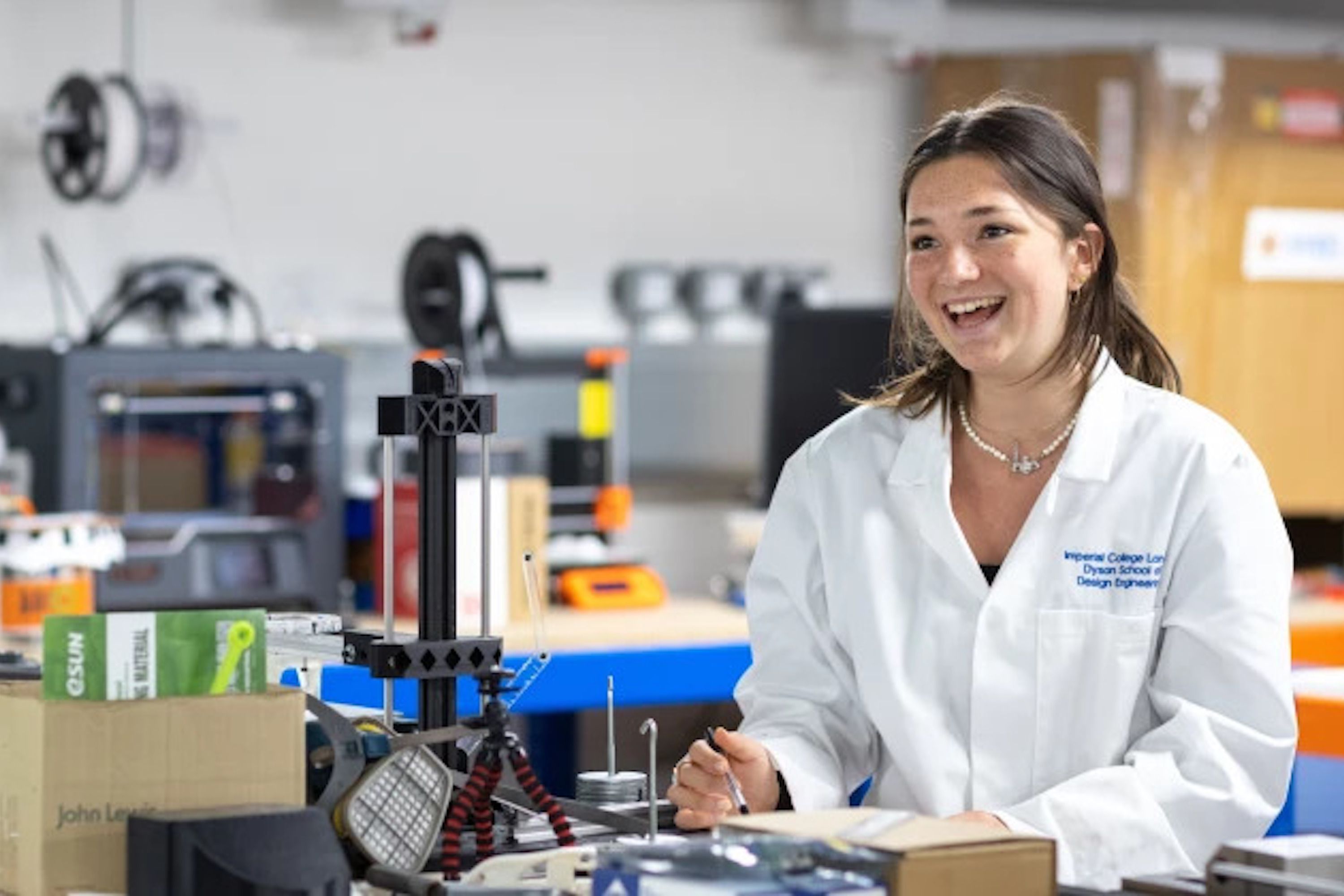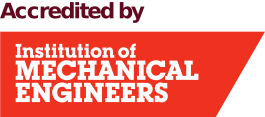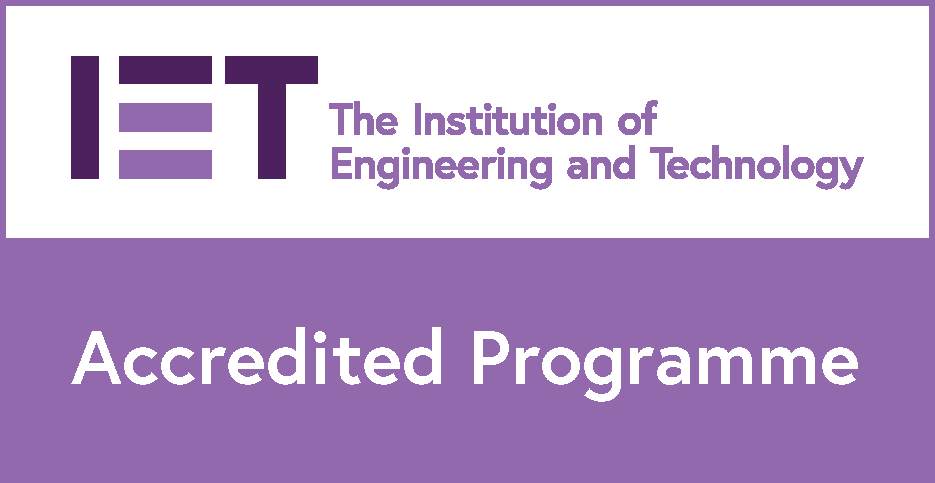
Design Engineering
Fuse design thinking with engineering knowledge and practice in this highly creative integrated Master’s degree
Fuse design thinking with engineering knowledge and practice in this highly creative integrated Master’s degree
Gain hands-on experience in the field on a six-month placement with a leading industrial partner.
Combine your engineering and design skills with business knowledge across a range of projects and workshops
Course key facts
Qualification
MEng
Duration
4 years
Start date
October 2025
UCAS course code
28G3
Study mode
Full-time
-
Fees
£9,535 per year Home
£43,300 per year Overseas
Delivered by
Location
-
South Kensington
-
Applications: places
7 : 1 (2023)
Minimum entry standard
A*AA (A-level)
39 points (International Baccalaureate)
Course overview
Discover how design engineers bridge the gap between traditional engineering and design on this professionally accredited four-year course.
You'll explore how engineers draw on manufacturing techniques, product development, technical design and rapid prototyping to bring new innovations to market. You'll also analyse how existing products can be improved, and the processes used to achieve this.
This course will develop your design and engineering skills, with an emphasis on creativity, computer-aided engineering, optimisation, human factors and the design process.
Through a series of compulsory modules during your first two years, you'll develop team working skills as you explore topics including electronics, mechatronics and data science.
Access to extensive hackspaces and workshops will enable you to collaborate with creative thinkers as you develop your own ideas. You'll also build your enterprise skills and industrial experience as you translate design engineering into impact.
Optional modules provide opportunities to specialise in your final two years, with a six-month paid placement the key focus of your third year.
This is designed to help you gain practical experience in the field with leaders in industry. Previous partner organisations have included Dyson, Jaguar Land Rover and Rolls Royce.
Your final year culminates with a series of projects, including the chance to expose one of your products to market reaction.
Structure
This page is updated regularly to reflect the latest version of the curriculum. However, this information is subject to change.
Find out more about potential course changes.
Please note: it may not always be possible to take specific combinations of modules due to timetabling conflicts. For confirmation, please check with the relevant department.
You’ll study these core modules.
Core modules
Explore design engineering in a global and professional context and how design engineering issues are creatively tackled.
Better understand computer programming through a hands-on approach and build your appreciation of the Python programming language and supporting tools.
Analyse the mathematical tools and techniques used to tackle a variety of design engineering problems.
Identify common engineering materials and the means to manufacture them into geometries.
Develop competence in creative human-centred design engineering and improve your skills in design drawing, engineering drawing and 3D computer aided design.
Explore a wide range of datasets, to perform data analysis and use key insights from statistics and machine learning.
Learn how to link force and displacement using laws of physics and how this can be used to model several real-world problems.
Develop your understanding of analogue and digital electronics as found in all electronics systems.
Professional accreditation
This degree is professionally accredited by the following organisations on behalf of the Engineering Council:
- Institution of Engineering Designers (IED)
- Institution of Mechanical Engineers (IMechE)
- Institution of Engineering and Technology (IET)
With this integrated Master’s degree, you’ll fully meet the academic requirements for professional registration as a Chartered Engineer (CEng).
With a professionally accredited degree, you’ll be able to demonstrate to employers that you have achieved an industry-recognised standard of competency. Professional accreditation also provides international recognition of your qualifications, which you can use to launch a career abroad.
Becoming a Chartered Engineer can further enhance your career prospects and earning potential. It demonstrates your competencies and commitment to lifelong learning – providing you with recognition in your field and greater influence and opportunities.
The accreditation from the IED runs from 2017 to 2025. The accreditation from IMechE runs from 2022 to 2026, and the accreditation from IET runs from September 2020 to August 2025. The department expects to be accredited by all three professional bodies in the future.
Associateship
In addition to your degree, you’ll receive the Associateship of the City and Guilds of London Institute (ACGI) upon completion of this course. This associateship is awarded by one of our historic constituent Colleges.
Teaching and assessment
Balance of teaching and learning
Key
- Timetabled sessions
- Independent study
Years 1 and 2
- 30% Timetabled sessions
- 70% Independent study
Years 3 and 4
- 15% Timetabled sessions
- 85% Independent study
Teaching and learning methods
-
Lectures
-
Tutorials
-
Workshops
-
Project-based learning
-
Virtual learning environment
Balance of assessment
Key
- Examination
- Coursework
- Practical
Year 1
- 50% Examination
- 40% Coursework
- 10% Practical
Year 2
- 25% Examination
- 50% Coursework
- 25% Practical
Year 3
- 10% Examination
- 60% Coursework
- 30% Practical
Year 4
- 0% Examination
- 75% Coursework
- 25% Practical
Assessment methods
-
Critiques
-
Group projects
-
Individual projects
-
Laboratory practicals
-
Presentations
-
Report writing
-
Written examinations
Testimonials
Entry requirements
We consider all applicants on an individual basis, welcoming students from all over the world.
Minimum entry standard
A*AA
To include:
- A* in Mathematics
- A, A in two further subjects
Not accepted: General Studies and Critical Thinking
Science Practical Endorsement: If you are made an offer you will be required to achieve a pass in the practical endorsement in all science subjects that form part of the offer.
Typical offer
A*AA (applicants studying three A-levels)
Made to at least 80% of 2023 A-level applicants.
Support for widening participation applicants
Our contextual admissions route for UK applicants may entitle you to additional considerations within the application process to help us form a more complete picture of your potential to succeed at Imperial.
Find out more about who is eligible and what support you may receive.
How to apply
Applications are closed for 2025 entry
Applications are closed for 2025 entry.
Admissions test (ESAT)
To be eligible for selection for this course for 2025 entry, you must sit the Engineering and Science Admissions Test (ESAT) as part of the application process.
Registration for the January 2025 test sitting is now closed. You can find more information about what to expect on your test day, including materials to help you prepare for the test, on the University Admissions Tests UK website.
About ESAT
- Computer-based, multiple-choice test which you must sit in a Pearson VUE test centre.
- Create a UAT-UK account with Pearson VUE to book a test.
For this course, you need to book and sit the following two ESAT modules:
- Module 1 – Mathematics 1
- Module 2 – Mathematics 2
Key test deadlines
October sitting (15 and 16 October 2024): Registration is now closed
January sitting (7 and 8 January 2025): Registration is now closed
Take the test just once as only your first score will count.
Test fee bursary
UK candidates in financial need can apply for a bursary voucher to book the ESAT free of charge.
Full details of eligibility criteria and how to apply are available on the UAT-UK website.
Access arrangements
Note: The deadline has now passed to apply for access arrangements for January 2025.
Access arrangements, for example, extra time or rest breaks, are available for students with learning difficulties, disabilities, and other medical conditions.
If this applies to you, you need to notify UAT-UK of your requirements before booking your test in one of Pearson VUE’s global network of test centres.
Once your access arrangements have been confirmed, you will be able to book your test online.
Assessing your application
Admissions Tutors consider all the evidence available during our rigorous selection process and the College flags key information providing assessors with a more complete picture of the educational and social circumstances relevant to the applicant. Some applicants may be set lower offers and some more challenging ones.
If your application has demonstrated sufficient potential you will be invited for an online interview. These typically run from November to March.
During the interview, your interest and aptitude will be assessed through a range of questions and problems. You are encouraged to present some examples of your own work/projects towards the end of the interview, although this will be for two minutes maximum, so please choose your examples carefully.
An ATAS certificate is not required for students applying for this course.
All students will undertake a six-month industrial placement from April until September between their third and fourth year of study.
The placement will be on-site with an industrial partner and supervised jointly by the partner and Imperial.
In the past, students have worked at a diverse range of companies including Dyson, Brompton Bicycles, Jaguar Land Rover, Rolls Royce, ABB Robotics, Microsoft Lift, Fitch, Monokoto, Random International, Better Future Factory and Cambridge Consultants.
Watch our video 'What does a Design Engineer do?' on YouTube
Fees and funding
Home fee
2025 entry
£9,535 per year
Important update for 2025 entry
The UK government has announced that, starting in April 2025, maximum tuition fees for Home undergraduate students in England will increase from £9,250 per year to £9,535. Find out more.
Your fee is based on the year you enter the university, not your year of study. This means that if you repeat a year or resume your studies after an interruption, your fees will only increase by the amount linked to inflation.
Find out more about our , including how inflationary increases are applied to your tuition fees in subsequent years of study.
Whether you pay the Home or Overseas fee depends on your fee status. This is assessed based on UK Government legislation and includes things like where you live and your nationality or residency status. Find out .
If you're a Home student, you can apply for a from the UK government to cover the entire cost of tuition for every year of your course.
The loan is paid directly to the university.
You will start repaying it only after you leave your course, have a job, and are earning above a certain amount.
Once the repayments start, the amount you pay each month depends on how much you earn, not on how much you owe in total.
Home students can apply for a means-tested to help with their living costs.
In November 2024, the UK government announced a 3.1% increase in English Maintenance Loans for 2025-26.
How you apply for student finance depends on whether you have studied before and where you’re from or normally live. Find out more on the UK government's website.
The is available to all Home undergraduate students with a household income below £70,000 per year.
The amount awarded is based on your household income, with up to £5,000/year available for students from the lowest income households.
It's money which you don't need to pay back, and it's paid on top of any government funding you may also receive.
It is available for each year of your course, as long as your annual household income remains below £70,000.
.
You might need to budget for additional costs related to your course that aren't covered by your tuition fees – like field trips, books and protective clothing.
Our extra costs page outlines the additional costs related to courses in each of our departments. It's not an exhaustive list and any additional costs you could incur will be determined by the course and modules you choose.
How will studying at Imperial help my career?
100% Of Imperial Design Engineering graduates in work or further study*
- 100% Of Imperial Design Engineering graduates in work or further study*
- 0%
77% Of Imperial Design Engineering graduates in highly skilled work or further study*
- 77% Of Imperial Design Engineering graduates in highly skilled work or further study*
- 23%
*2021-22 graduate outcomes data, published by HESA in 2024
Gain transferable skills relevant to a career in design engineering or similar fields.
With specialised knowledge, you'll be highly sought after in a range of sectors.
Leading design and technology companies are just some of your options.
Others have developed startups based on their entrepreneurial expertise.
Further links
Contact the department
- Telephone: +44 (0) 20 7594 8888
- Email: design.engineering@imperial.ac.uk

Request info
Learn more about studying at Imperial. Receive useful information about our life in our undergraduate community and download our latest Study Guide.

Events, tasters and talks
Meet us and find out more about studying at Imperial.

Course data
Terms and conditions
There are some important pieces of information you should be aware of when applying to Imperial. These include key information about your tuition fees, funding, visas, accommodation and more.
You can find further information about your course, including degree classifications, regulations, progression and awards in the programme specification for your course.
Programme specifications.png)

